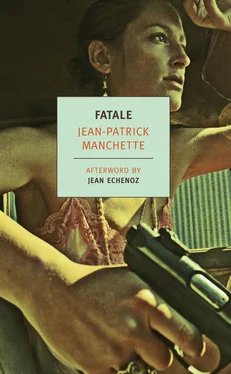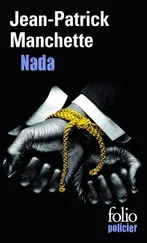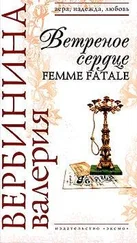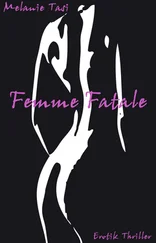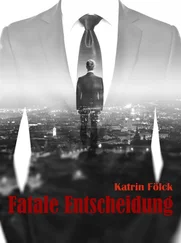Jean-Patrick Manchette - Fatale
Здесь есть возможность читать онлайн «Jean-Patrick Manchette - Fatale» весь текст электронной книги совершенно бесплатно (целиком полную версию без сокращений). В некоторых случаях можно слушать аудио, скачать через торрент в формате fb2 и присутствует краткое содержание. Год выпуска: 2011, ISBN: 2011, Издательство: New York Review Books, Жанр: Криминальный детектив, на английском языке. Описание произведения, (предисловие) а так же отзывы посетителей доступны на портале библиотеки ЛибКат.
- Название:Fatale
- Автор:
- Издательство:New York Review Books
- Жанр:
- Год:2011
- ISBN:978-1-59017-572-9
- Рейтинг книги:5 / 5. Голосов: 1
-
Избранное:Добавить в избранное
- Отзывы:
-
Ваша оценка:
- 100
- 1
- 2
- 3
- 4
- 5
Fatale: краткое содержание, описание и аннотация
Предлагаем к чтению аннотацию, описание, краткое содержание или предисловие (зависит от того, что написал сам автор книги «Fatale»). Если вы не нашли необходимую информацию о книге — напишите в комментариях, мы постараемся отыскать её.
Fatale — читать онлайн бесплатно полную книгу (весь текст) целиком
Ниже представлен текст книги, разбитый по страницам. Система сохранения места последней прочитанной страницы, позволяет с удобством читать онлайн бесплатно книгу «Fatale», без необходимости каждый раз заново искать на чём Вы остановились. Поставьте закладку, и сможете в любой момент перейти на страницу, на которой закончили чтение.
Интервал:
Закладка:
“It was a genuine revelation, you see,” said Aimée to the baron. “They can be killed. The real assholes can be killed. Anyway, I needed money but I didn’t want to work.”
“Seems reasonable,” said the baron.
“Mind you, this is work too, what I do,” said Aimée, reverting to the polite form of address. (And her delivery, somehow deadened during her last remarks, now almost completely regained its usual precision and trenchancy, and its rather elegant tones.)
But she appeared to be distracted. She seemed to be looking at the baron but not seeing him. The man was resting his chin on the stack of cardboard boxes behind which he had retreated. His lips were pale and his cheekbones protruded. Aimée gave him a quick summary of her work, telling how she would go from town to town, each time assuming a different personality, and how she would insinuate herself into the most elevated social circles, meaning rich people. And how she observed individuals, and their activities, and the conflicts that invariably arose among them.
“You always end up finding what you are looking for,” said the young woman. “There is always one fat real asshole who wants to kill another. The rest is a question of skill. Worming yourself into the client’s private life. Putting the idea of killing into his head, where in fact it already is. Then offering your services, ideally at a moment of crisis. I don’t tell them I’m a killer. I’m a woman, and they wouldn’t take me seriously. I tell them that I know a killer. Sometimes I let them assume that he is my lover. That makes them jealous. It’s fun.” She sighed audibly. “But now-now it has all gone to hell.”
A vague “Huh?” came from the baron.
“From the start, here in Bléville, things haven’t been working for me,” Aimée said. “I’ve been wasting time. I didn’t know whom to kill. For a moment I thought of suggesting to Sinistrat’s old lady that her wretch of a husband could be done in. Or proposing to Sinistrat and his little Julie that old Lenverguez be bumped off. But it was no good. These people are too dumb. It was you who were the ideal quarry, the right target.” Aimée swiveled her head vigorously, several times in quick succession. The movement disarranged her blond hair. Wisps of it strayed down over her forehead and the nape of her neck. “But it’s no good,” she said again. “You hate them even more than I do. You are even screwier than me. I can’t kill a guy like you.”
“It wasn’t viable in any case,” muttered the baron. He seemed to be having difficulty holding his head up straight. Being very preoccupied, Aimée did not notice the state he was in. “You can’t kill them one at a time,” he grunted. “You were bound to stop at some point. Sooner or later you would have been cornered. And even if you weren’t. The accepted and established laws are defended against the law of a single individual because they are not empty necessity, unconscious and dead, but are spiritual substance and universality, in which those in whom this spiritual substance is realized live as individuals, and are conscious of their own selves. Hence, even when they complain…” The baron paused to cough. A bloody froth had appeared in his nostrils. “Even when they complain of this ordinance,” he went on, “as if it went contrary to their own inmost law, and maintain in opposition to it the claims of the ‘heart,’ in point of fact they inwardly cling to it as being their essential nature; and if they are deprived of this ordinance, or put themselves outside the range of this influence, they lose everything.”
“I don’t understand a word you’re saying and I completely disagree!” cried Aimée. “All I am saying is that I cannot kill a man like you!”
“Right now, perhaps,” said the baron with a tired pout. “But your first shot caught me in the upper belly. Shit! What idiocy!” he cried with sudden ire. “You’ve killed me!”
His head lolled as far as it could. His whole body toppled sideways until it was lying along the wall. Since the piled-up boxes no longer concealed him, Aimée saw that the man’s pajamas and the lower portion of his torso were full of holes and covered with blood, and that the baron was dead. The young woman started to get up and go over to the body, but she abandoned the idea and went on sitting where she was, expressionless. She smoked a cigarette.
“You poor old guy,” she said at last. “Just wait and see what I’m going to do. Things are going to heat up around here. Just wait and see what I do to them, that bunch of pigs!”
She got to her feet and left the house.
14
“Well, well, well, my little lady,” said Commissioner Fellouque when he saw Aimée. “You’re going to break your neck. Where are you off to like that? Is something wrong?”
“I have just killed Baron Jules with a sporting gun,” said Aimée.
“My God!”
The dandified policeman drew the back of his hand across his mouth in indecision. He was on the sidewalk with one hand on his car, a Citroën DS21. Despite the biting cold he was wearing only a jacket; in his other hand he held his car keys; the front door of the car on the sidewalk side was open. Aimée had just appeared pedaling like mad, swung in towards the curb, and braked at the last moment; her bicycle had gone into a skid, the rear wheel banging into the sidewalk and the front one fetching up with a slight thud against the bumper of the DS21. The young woman had scrambled off her bike, almost falling to the ground, hopping aside. She let go of the bike, which tumbled onto its side with a clatter. Aimée’s face was streaming with sweat. She tried to get past the commissioner and make for the door to the police station, which was fifteen or twenty meters farther on. The man caught her by the upper arm.
“Where are you going?”
“To the cops,” Aimée told the commissioner. She shook her head impatiently. “Let me past. Come with me. I’m going to turn myself in. I’m going to confess.”
“You are not in a normal state,” said Fellouque, keeping a firm grasp on her arm. It was two thirty in the morning. The street was deserted. The tall lamps on low power bathed it in an orange half-light.
“What the fuck is it to you?” Aimée turned to face the commissioner with his large head. “What do you know about this anyway? I’m going to sink the lot of them. I’m going to give them all up. They’re rats! Swine! Dogs!”
“Who do you mean?” asked Fellouque.
“They paid me to kill Baron Jules,” said Aimée. “So come with me to the police station. I’ll make a complete statement.”
“But who? Who do you mean?” he repeated rather distantly.
“All of them,” answered Aimée, naming a few names and then giving a short laugh. “All of them,” she said again. “All those fine gentlemen.”
Without releasing Aimée, who seemed to be tottering, Commissioner Fellouque leaned over and reached into the DS21 to get his overcoat. Awkwardly, he slammed the door shut. With his coat under one arm, he pushed Aimée forward but did not let go of her.
“Lorque and Lenverguez?” he asked, repeating two of the names that Aimée had just supplied. “You mean to walk into the Bléville police station in the middle of the night and claim that Lorque and Lenverguez paid you to shoot a man? You must be crazy.”
“It’s the truth,” said Aimée. “Let go of me.”
She threw a forearm blow to the side of the commissioner’s neck. Fellouque let go of her and fell back. Had it not been for the parked DS21, he would have fallen flat on his back. Leaning against the car, he struggled to get his wind back, wincing, his eyes bulging. Aimée walked towards the police station.
“You are playing into their hands,” said Fellouque in a hoarse, very weak voice. Aimée halted. “You just don’t understand the situation here in Bléville. You’ll be found hanged. Tomorrow morning you’ll turn up hanging in your cell.” Fellouque was beginning to recover his voice. Aimée had struck him a rather moderate blow. She turned and looked at the policeman uncertainly. “It’s the examining magistrate you need to see. Not the station cops. You don’t understand anything.”
Читать дальшеИнтервал:
Закладка:
Похожие книги на «Fatale»
Представляем Вашему вниманию похожие книги на «Fatale» списком для выбора. Мы отобрали схожую по названию и смыслу литературу в надежде предоставить читателям больше вариантов отыскать новые, интересные, ещё непрочитанные произведения.
Обсуждение, отзывы о книге «Fatale» и просто собственные мнения читателей. Оставьте ваши комментарии, напишите, что Вы думаете о произведении, его смысле или главных героях. Укажите что конкретно понравилось, а что нет, и почему Вы так считаете.
